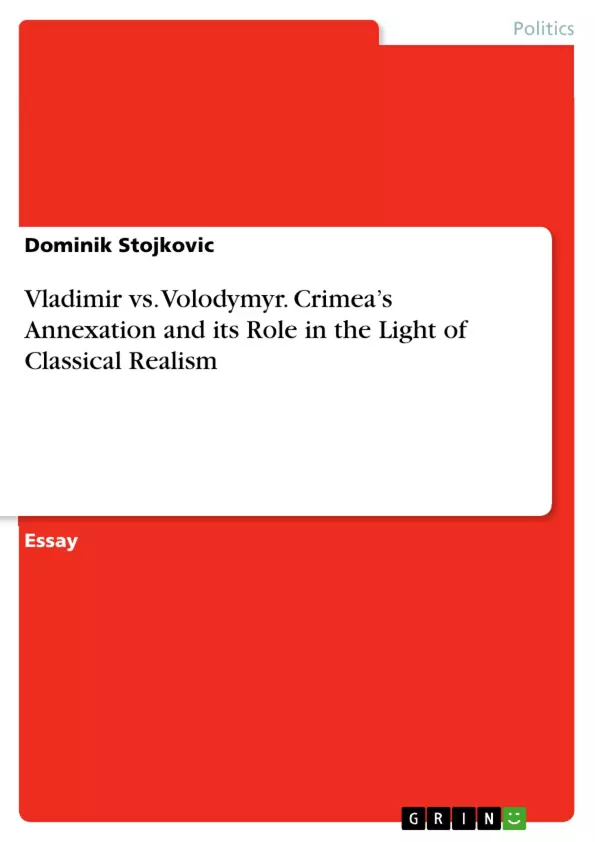The essay discusses Russian interference with the Ukraine crisis. Theoretically, I use Morgenthau's classical realism to examine the events that led to the annexation of Crimea and finally to the ongoing upheavals in Donbas. By analyzing applicable international law and bilateral treaties, I find that, in the early stages of the crisis, Moscow tried to exert influence on Ukrainian politics by exercising economic and political pressure. This may be due to an urge to prevent a weakening of its power position in the shadow of the – then impending – association between Ukraine and the EU. Russia thus pursued a policy of the status quo. However, later in the crisis, it annexed Crimea and resorted to military force and unconventional warfare. It has been found here that, after February 2014, Russian policy towards Ukraine shows essential features of a policy of imperialism.
Table of Contents
- Preface
- Chapter I - The Concept of Classical Realism
- Realism According to Morgenthau
- The Struggle for Power
- Chapter II - Russia's Intervention in the Light of Classical Realism
- Applicable International Law and Ukraine's Relevance
- Endangered Status Quo or Unrestrained Power Expansion?
Objectives and Key Themes
This work analyzes Russia's annexation of Crimea in 2014 through the lens of classical realism. The goal is to apply theoretical concepts of classical realism, specifically those of Hans J. Morgenthau, to understand Russia's actions and motivations.
- The concept of classical realism as a theoretical framework for understanding international relations
- The role of power in international politics according to Morgenthau
- The application of classical realism to Russia's intervention in Ukraine
- The interplay of international law and power politics in the Crimean crisis
- The potential impact of Russia's actions on the existing international order
Chapter Summaries
The first chapter introduces the concept of classical realism and explores the key tenets of Morgenthau's theory. It delves into the central role of power in international politics and the nature of states as actors driven by self-interest. The chapter examines Morgenthau's view of the international system as anarchic, where states operate in a constant struggle for power, seeking to maximize their influence and security.
Chapter II applies the principles of classical realism to the specific case of Russia's intervention in Ukraine. It explores the legal context of Russia's actions, examining the relevant international law and Ukraine's position within the international system. The chapter discusses the potential implications of Russia's actions for the existing international order, exploring whether its actions represent a shift in power dynamics or a mere attempt to preserve its regional dominance.
Keywords
The key keywords and focus topics of this work include classical realism, Hans J. Morgenthau, power politics, international relations, international law, state sovereignty, Ukraine, Crimea, Russia, annexation, intervention, security, and the international order.
Frequently Asked Questions: Crimea Annexation & Classical Realism
How does Classical Realism explain Russia's intervention in Ukraine?
Classical Realism, particularly Hans Morgenthau's theory, views the intervention as a struggle for power where Russia acted to prevent a weakening of its regional position due to Ukraine's rapprochement with the EU.
What is the difference between a policy of status quo and imperialism in this context?
Initially, Russia pursued a status quo policy by using economic pressure to maintain influence. After February 2014, the annexation of Crimea shifted this to a policy of imperialism, characterized by power expansion through military force.
What role did international law play in the Crimean crisis?
The analysis shows that while international law and bilateral treaties existed, they were secondary to the power-political interests of Russia during the annexation.
Who is Hans J. Morgenthau?
Hans J. Morgenthau was a leading figure in the study of international relations and the founder of Classical Realism, which emphasizes the central role of national interest and power.
What are the implications for the international order?
Russia's actions in Crimea are seen as a challenge to state sovereignty and the existing international order, reflecting an anarchic system where states strive to maximize their influence.
- Quote paper
- Dominik Stojkovic (Author), 2020, Vladimir vs. Volodymyr. Crimea’s Annexation and its Role in the Light of Classical Realism, Munich, GRIN Verlag, https://www.grin.com/document/950786



